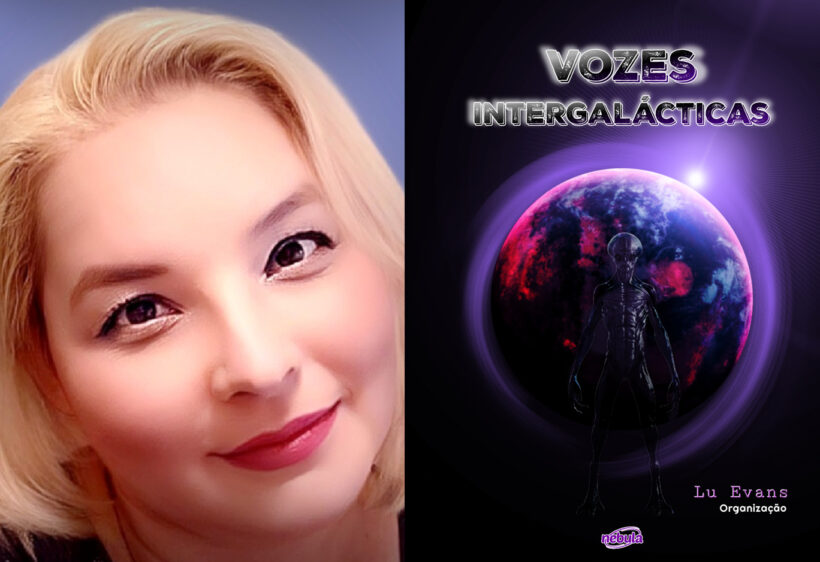Last year I submitted my short story, “The Japanese Rice Cooker” to the Brazilian anthology Fator Morus edited by Lu Evans. Since then, I have witnessed Lu’s relentless efforts to publish speculative writers from around the world. She does everything from scratch: write the proposal, publicize it, edit, contribute, design the cover, put together the book, and promote it. The books come in English and Spanish, but most of them are in Portuguese.
 |
For her most recent project, Vozes Intergalácticas, Lu asked me to write a prologue, and I was very honored to do so. The book congregates authors from Sweden, France, Portugal, and Brazil, of course. After reading the collection, I was also inspired to write a piece on my own because, as I said in the prologue, the purpose of the book is to find your voice. I’m thankful to all the contributors who allow me to have an intergalactic connection on my own and very thankful to Lu Evans, who is doing the same for many writers and readers from around the world. It’s an honor to interview Lu and has the opportunity to know more about her life, her motivations, and, more importantly, the galaxy she comes from that makes her SuperLu, the writer. |
JS/I’m curious about your background and how you started writing from the United States.
LE /I have a degree in Journalism from a federal university in Brazil, and I am currently studying Anthropology at New Mexico Central College. I started writing as a child, and worked in the theater during my teenage years, directing and writing plays. In 2013, I began releasing fantasy and sci-fi books. I always write in Portuguese but have now seven books in English and four in Spanish, as well as short stories published in magazines, anthologies, and narrated as audiobooks in the US and England.
JS/How does Brazilian culture feed your imagination? Has your life in the United States altered your way of writing?
LE /Brazilian culture is based on indigenous, African, and Portuguese traditions. My region was invaded by the French and the Dutch at the time of colonization, and many of them stayed there after the Portuguese took the land back, so there is a cultural mix that inspires and influences me. Living in the southwestern US since 2005 has reshaped my writing to a certain degree. Everything here is made to inspire artists. Dramatic landscape; strong Mexican tradition; stories of the Navajo, Hopi, Zuni, and Pueblo nations; old cowboy tales; ghost towns; adobe architecture; local cuisine; and archeological sites.
JS/ How many collections have you released so far? What is the process for editing and promotion? What’s your aspiration in making those collections?
LE /So far I have published 25 anthologies, three of which unite authors from different countries. I began editing anthologies in 2019 when I found out that my mother would only have a few months to live. I needed something new and challenging, and, like always, literature helped me get through difficult times. Sometimes friends suggest a theme, but almost always I decide on the theme and the title but don’t really know how the ideas come to me. I usually take care of the process from beginning to end: reading, proofreading, translating, making the cover, and so on. It’s hard work, but I don’t mind. Everybody involved helps to promote it on their social media. My aspiration is to produce and offer free contemporary speculative literature.
JS/ How do you define your writing? What kind of genre do you like writing? Would you call it speculative fiction, sci-fi, or fantasy?
LE/ I write different genres and subgenres within speculative literature: science fiction, folk science fiction, dystopia, folk fantasy, science fantasy, historical fantasy, dark fantasy, gothic, paranormal, and magical realism. I don’t write horror, and I don’t have much interest in medieval fantasy or cyberpunk. I try to keep my writing simple and objective, yet elegant, and avoid overdoing anything. I write only what’s necessary to tell the story.
JS/ My emotional life, current political events, and general contemporary life play a role in my creation process. Do you feel the same? If so, can you give some examples of that?
LE /I try to leave out my political views and personal life when I am telling a story. My stories are based on myths, legends, folklore, scientific concepts and discoveries, and once in a while some crazy conspiracy theories because they are fun. My main goal is to entertain the readers, but everything I write is the product of research. If I write a story in prehistory, I will put information from what archaeologists have discovered and proven. It is never just my imagination.
JS/ You recently released a collection of short stories called Intergalactic Voices. Is there any moral objective in doing a collection like that? Do you consider improving the world while bringing these writers together in an anthology? Why is writing about aliens still valid when facing a climate catastrophe?
LE /Writers from Brazil, Portugal, France, and Switzerland participate in this collection (in Portuguese only), and the preface is signed by you, a Colombian author. In this anthology, each story features a different type of alien recorded in mythology or ufology. There are the traditional types: Gray, Reptilian, Nordic, and others not so famous, such as Cetians, Alpha Draconis, Nommos, and Rakk, among many others. It is never my intention to try to change or improve the world as a writer or editor. I actually doubt that literature has the power to change anything. Let’s take climate as an example. Sci-fi writers—and their aliens—are not very useful to solve a problem like this. The only thing we can do is to keep writing and hope the readers will like our stories and reflect upon them.
JS/ How do you describe your collections? What are the values that your collections transmit to the readers? Can you point them out within specific stories?
LE/ Each collection is an exchange between different cultures. Diversity is what I seek. Uniting authors from different places is a small action against racism. Still, there is a sense of accomplishing something worthy. In Intergalactic Voices, each author used their alien to speak about a different situation/subject, giving them emotional, psychological, and even human layers. Mine is called My Friend Bob, and is about how easily people can be fooled when subjected to government propaganda and high technology. The plot is set in the 1940s, just after a spaceship supposedly crashed in Roswell, NM, but the situation is not alien to our modern life as we are constantly exposed to political agendas and artificial intelligence.
JS/ What lessons have you learned from this collection and your interaction with the writers?
LE/ I have close contact with most of the authors. We do exchange information and knowledge, and work together on other projects. So, I can say I learn every day from other experiences and cultures. My newer anthology, Intergalactic Voices, gave me the opportunity to work with Portuguese authors. Although the language is the same, the way to speak and write is different, and it was a rich linguistic experience for me.
JS/ How do you feel about the AI interaction during our writing process?
LE/ All I want is distance from AI in the writing process, and I agree with the position of many editors who block the participation of AI-produced texts in their anthologies. If a writer does not want to take the time to write, he must go ahead and choose something else to do.
JS/Your collections gather writers from Asia, Europe, the United States, and South America, especially Brazil. Do writers have different tendencies and trends according to each region, or on the contrary, do all the writers converge on similar paths?
LE/ They are from Argentina, Bolivia, Costa Rica, Colombia, Mexico, Uruguay, the United States, Brazil, Canada, Nepal, Poland, Portugal, France, Switzerland, and Bosnia and Herzegovina. They represent their countries and have specific ways to tell stories and construct the characters. It is even possible to feel a different atmosphere, proper to that distant country, in each short story. For example, the authors from tropical countries write more colorful and sunny stories, while the European ones are colder and somber. My goal is to turn the collections into spaces where we exercise diversity.
JS/What do you think about Afrofuturism? How do you approach it from a Brazilian perspective? Do you notice similar movements in other parts of the world that aim to be more inclusive?
LE/ I think it’s fascinating. One of my favorite series is Xenogenesis, by Octavia Butler. I’ve never written afrofuturism. I imagine some people won’t see me as someone who can represent the genre. Maybe people will say I have no right to discourse about Black people and their troubles. We must consider situations like this before deciding what to write. One thing is to have one or two Black characters in your story, another is to write afrofuturism. However, some Black authors have already published in this genre in my collections. In Intergalactic Voices, for instance, there is a well-known author from Brazil, Sandra Menezes, who writes primarily afrofuturism. I think this genre is stronger in the American and African continents despite the globalization and the constant migrations that are happening in the other parts of the globe. I don’t recall any inclusive movement as strong as this one elsewhere.
JS/Tell me about your future projects and how the audience has welcomed Intergalactic Voices?
LE/ There are some interesting things happening this year. I’ll be participating for the first time in a regional collection with authors from my home state in Brazil. Another short story will be part of a US anthology about dragons. I plan to release a collection of magic realism with authors from Brazil and India in the second half of the year. There is also a collection of folk science fiction with Brazilian authors, but this may only come out in early 2024.
As for the collection Intergalactic Voices, science fiction readers are very fond of aliens and are enjoying them very much.
Well, Lu Evans didn’t exactly tell us what galaxy she got all her powers from, but every Superheroine has the right to keep her secrets.






